
Soweto is a township of the City of Johannesburg Metropolitan Municipality in Gauteng, South Africa, bordering the city's mining belt in the south. Its name is an English syllabic abbreviation for South Western Townships. Formerly a separate municipality, it is now incorporated in the City of Johannesburg Metropolitan Municipality, and one of the suburbs of Johannesburg.
Kwaito is a music genre that emerged in Soweto, Johannesburg, South Africa, during the 1980s. It is a variant of house music that features the use of African sounds and samples. Kwaito songs occur at a slower tempo range than other styles of house music and often contains catchy melodic and percussive loop samples, deep bass lines, and vocals. Despite its similarities to hip hop music, kwaito has a distinctive manner in which the lyrics are sung, rapped and shouted.
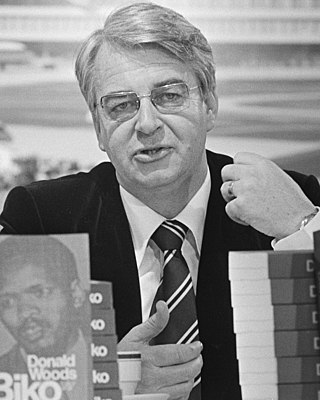
Donald James Woods was a South African journalist and anti-apartheid activist. As editor of the Daily Dispatch, he was known for befriending fellow activist Steve Biko, who was killed by police after being detained by the South African government. Woods continued his campaign against apartheid in London, and in 1978 became the first private citizen to address the United Nations Security Council.
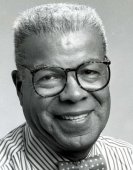
Charles Sumner "Chuck" Stone, Jr. was an American pilot, newspaper editor, journalism professor, and author. He was a member of the Tuskegee Airmen during World War II and was the first president of the National Association of Black Journalists, serving from 1975 to 1977. Passionate about racial issues and supportive of many liberal causes, he refused to follow any party line, "but called the issues as he saw them."
Aggrey Zola Klaaste OMSG was a South African newspaper journalist and editor. He was best known for being editor of the Soweto-based newspaper, the Sowetan, from 1988 to 2002. He introduced the concept of "nation building" while editor of the Sowetan and spent much of his time and energy promoting the idea.

The Sowetan is an English-language South African daily newspaper that started in 1981 as a liberation struggle newspaper and was freely distributed to households in the then apartheid-segregated township of Soweto, Johannesburg, Gauteng Province.
The Black Consciousness Movement (BCM) was a grassroots anti-apartheid activist movement that emerged in South Africa in the mid-1960s out of the political vacuum created by the jailing and banning of the African National Congress and Pan Africanist Congress leadership after the Sharpeville Massacre in 1960. The BCM represented a social movement for political consciousness.
[Black Consciousness'] origins were deeply rooted in Christianity. In 1966, the Anglican Church under the incumbent, Archbishop Robert Selby Taylor, convened a meeting which later on led to the foundation of the University Christian Movement (UCM). This was to become the vehicle for Black Consciousness.
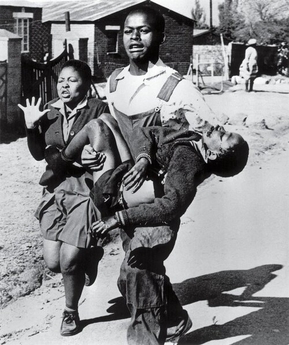
The Soweto uprising was a series of demonstrations and protests led by black school children in South Africa during apartheid that began on the morning of 16 June 1976.
The National Association of Black Journalists (NABJ) is a 501(c)3 nonprofit educational and professional organization of African-American journalists, students, and media professionals. Founded in 1975 in Washington, D.C., by 44 journalists, the NABJ's stated purpose is to provide quality programs and services to and advocate on behalf of black journalists. The organization has worked for diversity and to increase the number of minorities in newsrooms across the country.
The World, originally named The Bantu World, was the black daily newspaper of Johannesburg, South Africa. It is famous for publishing Sam Nzima's iconic photograph of Hector Pieterson, taken during the Soweto uprising of 16 June 1976.
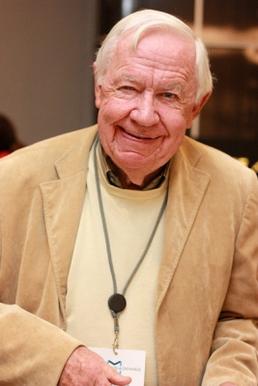
Allister Haddon Sparks was a South African writer, journalist, and political commentator. He was the editor of The Rand Daily Mail when it broke Muldergate, the story of how the apartheid government secretly funded information projects.
Nathaniel Ndazana Nakasa better known as Nat Nakasa was a South African journalist and short story writer.
Gwen Lister is a Namibian journalist, publisher, anti-apartheid and press freedom activist.

Internal resistance to apartheid in South Africa originated from several independent sectors of South African society and took forms ranging from social movements and passive resistance to guerrilla warfare. Mass action against the ruling National Party (NP) government, coupled with South Africa's growing international isolation and economic sanctions, were instrumental in leading to negotiations to end apartheid, which began formally in 1990 and ended with South Africa's first multiracial elections under a universal franchise in 1994.

Anas Aremeyaw Anas, better known as Anas, is a Ghanaian journalist born in the late 1970s. He utilizes his anonymity as a tool in his investigative journalism work. Anas is a politically non-aligned multimedia journalist who specializes in print media and documentaries. He focuses on issues of human rights and anti-corruption in Ghana and sub-Saharan Africa. In December 2015 Foreign Policy magazine named Anas one of 2015's leading global thinkers. In 2016 Anas had a "Best Journalist" award named after him by the Press Foundation in Ghana.

Allissa V. Richardson is an American journalist and college professor. She is best known as a proponent of mobile journalism and citizen journalism. Richardson has trained students in the United States and Africa to report news using only smartphones, tablets and MP3 players. She is assistant professor of journalism in the Annenberg School for Communication and Journalism at the University of Southern California. Additionally, Richardson is a Nieman Foundation Visiting Journalism Fellow at Harvard University, the 2012 Educator of the Year for the National Association of Black Journalists, and a two-time Apple Distinguished Educator.
Zwelakhe Sisulu was a South African black journalist, editor, and newspaper founder. He was president of the Writers' Association of South Africa, which later became the Black Media Workers Association of South Africa, and he led a year-long strike in 1980 for fair wages for black journalists. Under apartheid, he was imprisoned at least three times for his journalism. After apartheid ended, he became the chief executive officer of the South African Broadcast Corporation.
The Nat Nakasa Award for Media Integrity is an award presented to a South African media practitioner in newspapers, magazines, broadcasting and online print media and whose reporting celebrates freedom of speech and media integrity. The award is managed and presented by the South African National Editors Forum (SANEF).
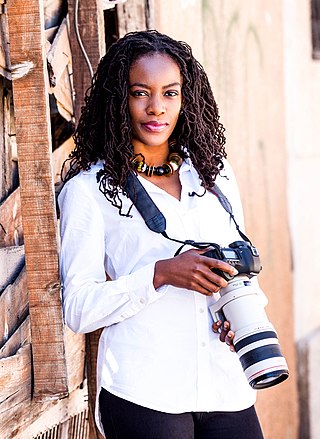
Chikaodinaka Sandra Oduah is a Nigerian-American journalist who has worked as a television news producer, correspondent, writer and photographer. She is currently a correspondent for VICE News. Known for her unique human-focused ethnographic reporting style with an anthropological approach, she was awarded a CNN Multichoice African Journalist Award in 2016. Upon the abduction of 276 schoolgirls by the terrorist group Boko Haram in Chibok, northeastern Nigeria, she was the first international journalist to visit and spend extensive time in the remote community of Chibok. Her thorough and exclusive coverage of the mass kidnapping won her the Trust Women "Journalist of The Year Award" from the Thomson Reuters Foundation in 2014. Oduah's reporting explores culture, history, conflict, human rights, and development to capture the complexities, hopes and everyday realities of Africans and people of African descent.
Betty Winston Bayé , an African-American journalist, columnist, and former member of the editorial board for the Courier-Journal newspaper in Louisville, Kentucky, United States, and Gannett is a journalist, former host of The Betty Baye Show TV program, and author. She is a former Vice President of the National Association of Black Journalists and an inductee into its Hall of Fame.










